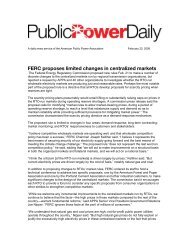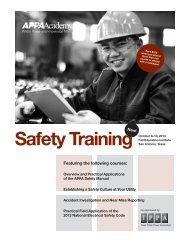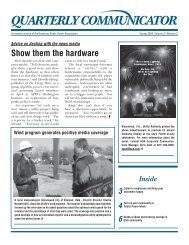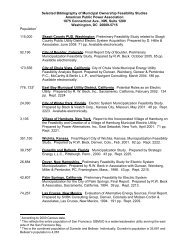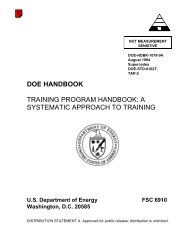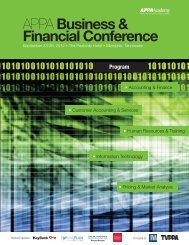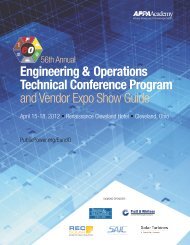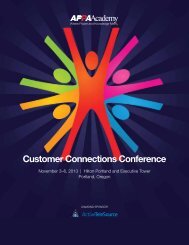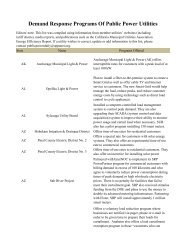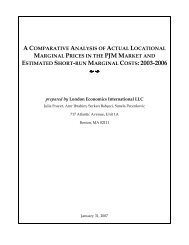Fall Education Institute Brochure - American Public Power Association
Fall Education Institute Brochure - American Public Power Association
Fall Education Institute Brochure - American Public Power Association
You also want an ePaper? Increase the reach of your titles
YUMPU automatically turns print PDFs into web optimized ePapers that Google loves.
Where <strong>Power</strong> and Knowledge MeetWhere <strong>Power</strong> and Knowledge Meet<strong>Fall</strong><strong>Education</strong><strong>Institute</strong>Save$100when you attendmore than one courseor attend witha colleague!Oct. 1–5, 2012Loews Vanderbilt HotelNashville, TNFeaturing courses onthe following topics:AccountingCost of Service andRetail Rate DesignNEWFORMAT!NEWCONTENT!Financial Planning forMunicipal UtilitiesKey Accounts Certificate Program2012 APPA Safety Manual NEW!OverviewOverhead Distribution Systems<strong>Public</strong> <strong>Power</strong> Leadership Workshop
2012 APPA <strong>Fall</strong> <strong>Education</strong> <strong>Institute</strong>Learn Together, Grow TogetherAPPA’s seasonal education institutesoffer in-depth training courses for allskill levels. <strong>Institute</strong>s allow attendeesto focus on a single topic or spendthe week in multiple classes formore comprehensive training.Classes are designed by instructorswho have decades of industryexperience and understand the specificneeds of public power utilities.The <strong>Institute</strong> format also provides anexcellent opportunity to networkwith industry peers and earn continuingeducation credits.AccountingA great way to earn valuable CPE creditsContinuing <strong>Education</strong> CreditsCPEs PDHs CEUs<strong>Public</strong> Utility Accounting 15 13 1.3Work Order and AssetManagement Accounting 7.5 6.5 .7Advanced <strong>Public</strong> UtilityAccounting 15 13 1.3NEWFORMAT &CONTENT!Cost of Service & Retail Rate Design/Financial PlanningHighly interactive courses full of real-world examples and exercisesContinuing <strong>Education</strong> CreditsCPEs PDHs CEUsBasic Cost of Service& Retail Rate Design 12 10.5 1Intermediate Cost of Service& Retail Rate Design 12 10.5 1Advanced Cost of Service& Retail Rate Design 7.5 6.5 .7Financial Planningfor Municipal Utilities 7.5 6.5 .7
Key Accounts Certificate ProgramA comprehensive program for key accounts professionalswho want to enhance their skillsContinuing <strong>Education</strong> CreditsCPEs PDHs CEUsImplementing a Customer-FocusedKey Accounts Program 10.5 9 .9Developing Your Key AccountsRepresentative 10.5 9 .9The Effective Key Accounts Toolbox 10.5 9 .9Technical TrainingTailored to engineers, designers, construction/operations,field and safety personnelContinuing <strong>Education</strong> CreditsCPEs PDHs CEUs2012 APPA Safety Manual Overview 7.5 6.5 .7NEW!Overhead Distribution Systems 26 23 2.3<strong>Public</strong> <strong>Power</strong> Leadership WorkshopDesigned for seasoned, new and aspiring public powerCEOs and executive managementContinuing <strong>Education</strong> CreditsCPEs PDHs CEUs<strong>Public</strong> <strong>Power</strong> LeadershipWorkshop 19 16 1.8
2012 APPA <strong>Fall</strong> <strong>Education</strong> <strong>Institute</strong>1UtilityAccountingCoursesA great way to earnvaluable CPE creditsTechnologyRequirementsTo participate fully inthese classes, pleasebring a calculator.<strong>Public</strong> Utility AccountingMonday, Oct. 1–Tuesday, Oct. 2Monday: 8:30 a.m.–5 p.m.Tuesday: 8 a.m.–4 p.m.Recommended CEUs 1.3/PDHs 13/CPEs 15Field of Study: AccountingFor CPE accreditation, this course is a group-live offering.Course OverviewThis course covers accounting theory, the role of accountingin public utilities, Federal Energy Regulatory Commission accountingprocedures, uniform system of accounts, and utilityaccounting subsystems.Course Topics■ Accounting for operating revenues and expenses■ Balance sheet and income statement preparation■ Introduction to utility property and plant accounting■ Introduction to FERC uniform system of accounts■ Applicability of generally accepted accountingprinciples to public utilities■ Financial statement structure and presentation■ Capital vs. expense determination■ Allocation of indirect or common costs■ Accounting for unbundled servicesCourse LevelBasic. This course does not have prerequisites nor does itrequire advance preparation.Who Should AttendThis course is designed for personnel who are new to utilityaccounting practices or unfamiliar with the FERC accountingstructure. Experienced accountants and accounting managerswho want to enhance their knowledge of utility accountingpractices can also benefit from this course.InstructorJerry McKenzie, senior associate with MGT of America,Inc. and author of several articles and publications. He hasmore than 20 years of experience with cost accounting conceptsand practical applications.
Utility Accounting CoursesWork Order and Asset ManagementAccountingWednesday, Oct. 38:30 a.m.–5 p.m.Recommended CEUs .7/PDHs 6.5/CPEs 7.5Field of Study: AccountingFor CPE accreditation, this course is a group-live offering.Course OverviewThis highly interactive course is designed to increase theeffectiveness of processes that support work order assetmanagement accounting and job costing.Course Topics■ Overview of the work order and asset managementprocess and the importance of accurate plant accountingand reporting■ Developing and implementing a work orderand asset management system■ Plant accounting concepts and methods to implementand/or improve existing methods, including:■ Construction standards■ Project estimates■ Developing overhead cost allocation■ Cost accumulation processes throughthe use of work orders■ Unitizing construction costs and closing work orders■ Retirement accounting■ Job completion and closeout■ Common utility policies and procedures■ Class exercises to estimate, close, andquality-review construction cost work orders■ Overcoming barriers in an organizationreluctant to changeCourse LevelBasic. This course does not have prerequisites nor does itrequire advance preparation.Who Should AttendThis course is designed for utility accounting and financepersonnel.InstructorRussell Hissom, CPA, Partner in the Energy and UtilitiesGroup, has been with Baker Tilly Virchow Krause LLPsince1983 and specializes in serving the financial and operationalneeds of the utility industry.Advanced <strong>Public</strong> Utility AccountingThursday, Oct. 4–Friday, Oct. 5Thursday: 8:30 a.m.–5 p.m.Friday: 8 a.m.–4 p.m.Recommended CEUs 1.3/PDHs 13/CPEs 15Field of Study: AccountingFor CPE accreditation, this course is a group-live offering.Course OverviewThis course examines some of the more complicated aspectsof accounting theory and practice.Course Topics■ Review of utility accounting theory and accountingpronouncements update■ Financial statement presentation■ Establishing work order asset management systems■ Using benchmarking as a management tool■ Financial statement analysis■ Capital structure and its importance inutility strategic planning■ Alternatives to traditional financing■ Methods for determining unbilled revenues■ Accounting for investments andderivative financial instruments■ Accounting for impairment of long-lived assets■ Functionalizing■ Special topics, such as environmental accountingand unbilled revenuesAdditional Technology RequirementIn addition to a calculator, please bring a copy of your annualfinancial statement.Course LevelIntermediate/Advanced. This course is recommended as afollow-up to APPA’s <strong>Public</strong> Utility Accounting course.Who Should AttendThis course is designed for utility accounting and financepersonnel who have taken APPA’s <strong>Public</strong> Utility Accountingcourse or who, through experience, have an introductoryknowledge of utility accounting theory and practice.InstructorsRussell Hissom, CPA, Partner in the Energy and UtilitiesGroup, has been with Baker Tilly Virchow Krause LLP since1983 and specializes in serving the financial and operationalneeds of the utility industry.Aaron Worthman, CPA, Partner in the Energy and UtilitiesGroup, has been with Baker Tilly Virchow Krause LLPsince1998 and specializes in serving utilities, joint actionagencies and public utility commissions.
2012 APPA <strong>Fall</strong> <strong>Education</strong> <strong>Institute</strong>2Cost of Service& Retail RateDesign/FinancialPlanningCoursesHighly interactive courses full ofreal-world examples and exercisesTechnology RequirementsTo participate fully in these classes,please bring a calculator and alaptop with Excel and <strong>Power</strong>Point.Basic Utility Cost of Service& Retail Rate DesignNEWFORMAT &CONTENT!Monday, Oct. 1–Tuesday, Oct. 2Monday: 8:30 a.m.–5 p.m.Tuesday: 8:30 a.m.–NoonRecommended CEUs 1/PDHs 10.5/CPEs 12Field of Study: Specialized Knowledge and ApplicationsFor CPE Accreditation, this course is a group-live offering.Course OverviewThis course covers the basic concepts of utility costing andpricing using standard industry approaches. The instructorwill focus on electric cost of service and retail rate designusing fully distributed, allocated cost methods and principlesthat are applicable to water, sewer, gas and other municipalservices.Participants will learn where and how information is obtained,how a utility’s costs are incurred and how to developallocation factors to reflect a utility’s causation of the costs.Attendees will work through exercises to classify generation,transmission and distribution service expenses and workthrough a sample cost-of-service analysis in Microsoft Excel.Participants will also work with standard rate forms used toIntermediate Utility Cost of Service& Retail Rate DesignTuesday, Oct. 2– Wednesday, Oct. 3Tuesday: 1–5 p.m.Wednesday: 8:30 a.m.–5 p.m.Recommended CEUs 1/PDHs 10.5/CPEs 12Field of Study: Specialized Knowledge and ApplicationsFor CPE Accreditation, this course is a group-live offering.Course OverviewThis hands-on course builds on basic cost-of-service conceptsand features exercises and practical applicationsusing a fully functional cost-of-service/unbundling and ratedesign model in Excel. Participants will work through exercisesthat reflect real-life experiences to gain a workingknowledge of how a cost-of-service study is completed andused when designing electric rates. The instructors will alsodiscuss ways to deal with customers and tactics for workingwith governing boards on rate issues.
Cost of Service & Retal Rate Design Coursessend proper price signals and recover costs in a fair and equitablemanner.Course Topics■ Identifying relevant terms, costs and data sources■ Collecting and organizing costs■ Purpose of cost classification or functionalization■ Types of generation resources andindustry-standard classification techniques■ Uses and classification of distribution systemcomponents based on customers’ service levels■ Developing allocation factors for generation, distributionand customer-related expenses■ Developing allocation factors used to distribute coststo customer classes■ Costs recovered through demand, energyand customer charges■ Determining the monthly customer chargeusing industry-standard classification techniques■ Interpreting the results of the cost-of-service studycompleted in classCourse LevelBasic. This course does not have prerequisites nor does itrequire advance preparation.Who Should AttendThis is an introductory course for utility staff and policymakersinvolved in the costing and pricing of electric utility services.It covers basic concepts and methodologiessurrounding traditional cost-of-service allocation and retailrate design.InstructorPhillip Euler, P.E., is the manager of engineering servicesfor NMPP Energy in Lincoln, Neb. Prior to joining NMPP Energy,Euler worked as an independent consultant, specializingin financial planning, cost-of-service studies and ratedesign for publicly owned utilities. He worked for the LincolnElectric System for 30 years, specializing in the areas of financialplanning, pricing, rate design and cost-of-servicestudies.Course Topics■■■■■■■■■■Verify information obtained from the billingand accounting departmentsDetermine revenue requirements using bothcash basis and utility basis methodologiesIdentify techniques to obtain, develop andapply load research dataDiscuss advanced methods of classifying andallocating distribution and power supply costs toeach customer classLearn how cost allocation factors are appliedDiscuss bundled and unbundled costsLearn how cost-of-service results are used andtheir application to rate designs for customersLearn why unbundling rates can provide insight on theaccuracy of the COS study and the rate design processDiscuss the limitations of a traditionalcost-of-service modelEvaluate rate change bill impacts and discussways to minimize customer complaintsCourse LevelIntermediate. This course is recommended as a follow-upto APPA’s Basic Utility Cost of Service & Retail Rate Designcourse.Who Should AttendThis intermediate course is designed for utility staff lookingto learn how the cost-of-service process is completed andapplied.InstructorsMark Beauchamp, CPA, CMA, MBA, is president of UtilityFinancial Solutions, a consulting practice that specializes infinancial planning, cost of service, and rate-setting for publicpower utilities. He has more than 28 years of experience inelectric utility consulting and management.Phillip Euler, P.E., manager of engineering services, NMPPEnergy, Lincoln, Neb.
Cost of Service & Retail Rate Design/Financial PlanningAdvanced Utility Cost of Service& Retail Rate DesignThursday, Oct. 48:30 a.m.–4:30 p.m.Recommended CEUs .7/PDHs 6/CPEs 7.5Field of Study: Specialized Knowledge and ApplicationsFor CPE Accreditation, this course is a group-live offering.Course OverviewIn this course, attendees will go through the process of developinga marginal cost rate and learn how traditional costof-servicestudies are used to support aspects of a marginalcost study. The instructor will discuss industry trends onelectric rate development and the positives and negatives ofalternative rate structures.Participants will gain practical experience and knowledgeof the issues faced when developing rates and the instructorwill provide an Excel model for participants to follow whendeveloping sample rates. The instructor will also discusshow to work effectively with governing bodies to develop financialplans for future rate adjustments.Course Topics■ Current industry rate trends■ Rates that promote financial stabilityand energy conservation■ Positives and negatives of alternative rate structures■ Developing time-differentiated(time-of-use) rate structures■ Options for developing economic development rates■ Analyzing customer usage patternsto obtain load research information■ Developing feed-in rate tariffs, net metering ratesand standby rates■ The purpose and types of power cost adjustmentmechanisms■ Developing interruptible rates■ Issues to be aware of when developing car-charging rates■ Working with boards and city councils todevelop financial plans for future rate adjustmentsCourse LevelIntermediate/Advanced. Participants need a basic understandingof the cost allocation process through experienceor attending APPA’s Basic or Intermediate Utility Cost ofService and Retail Rate Design courses.Who Should AttendThis course is for utility staff who are looking for advancedknowledge of cost-of-service and ratemaking processes.InstructorMark Beauchamp, CPA, CMA, MBA, president,Utility Financial Solutions, Holland, Mich.Financial Planning forMunicipal UtilitiesNEWCONTENT!Friday, Oct. 58:30 a.m.–4:30 p.m.Recommended CEUs .7/PDHs 6/CPEs 7.5Field of Study: Specialized Knowledge and ApplicationsFor CPE Accreditation, this course is a group-live offering.Course OverviewThe financial health of the utility is a key component to providingreliable service to customers. In this highly interactivecourse, participants will learn why financial planning is criticalto the current and future success of public power utilities.The course includes examples and exercises in which participantsdetermine the financial targets of a utility and developa long-term rate track to help ensure the utility’s financialstability.Course Topics■ Key financial targets for a utility to ensure financial stability■ Determining how much cash a utility should maintainin reserves and things to consider when developing acash reserve policy■ How to communicate with governing bodieswhen trying to get rate adjustments approved■ Identifying the amount of capital replacementsthat should be included in customer rates■ Understanding the difference between cash and utilitybasis in determining revenue requirements and thestrengths and weaknesses of each method■ Identifying the amount of bond proceeds neededto fund a capital improvement program■ Discuss common cross subsidies betweencity departments and their impact on utilities■ Develop long-term financial plans and rate tracksto achieve financial targets■ Learn how to achieve the proper balance betweenmaintaining the financial health of the utility whileminimizing impacts on your customersCourse LevelBasic/Intermediate. This course does not have prerequisitesnor does it require advance preparation.Who Should AttendThis course is designed for utility personnel involved in financialplanning, including general managers, finance andaccounting personnel and rate analysts.InstructorDawn Lund is vice president of Utility Financial Solutions,and has completed more than 60 water, wastewater andtelecommunications cost-of-service and rate design studies.She has more than 15 years of experience in pricing andmarketing utility services and holds a degree in accounting.
2012 APPA <strong>Fall</strong> <strong>Education</strong> <strong>Institute</strong>3Program DescriptionToday’s quickly evolving electric industry requires key accountsfront-line employees to have specific skills, technicalknowledge and training. To help these individuals meet theirneeds, the APPA Academy is pleased to offer its Key AccountsCertificate Program®.Key accounts personnel who complete the program’sthree required courses, pass an online exam, and file a keyaccounts business plan and a customer marketing planwithin two years of completing the coursework will earn aKey <strong>Public</strong> <strong>Power</strong> Account Executive (KPPAE) certificate.Those who wish to maintain their designation must complete20 hours of additional approved continuing educationtraining (not limited to APPA Academy offerings) every twoyears.Who Should AttendThis program is designed for individuals employed as keyaccount representatives and those who manage a utility’skey accounts program.Program RequirementsTo earn this certificate, participants must complete the followingrequirements within two years:Tailored to key accounts professionalswho want to enhance their skillsComplete the three required courses■ Implementing a Customer-FocusedKey Accounts Program■ Developing Your Key Accounts Representative■ The Effective Key Accounts ToolboxPass an online examCourses can be taken individually oras part of the certificate program.Submit a key accounts business plan and customermarketing planInstructorWallace Barron has 40 years of experience in the electricenergy industry. He is president of the Atlanta-based consultingfirm, Barron & Associates, Inc., which serves theenergy industry in the areas of strategic planning, marketing,customer service, key accounts and competitive issues. Hepreviously worked as the vice president of marketing, customerservice and distribution technology at Florida <strong>Power</strong>Corp. His responsibilities have included key accounts,competitive marketing, market research, customer service,economic development, demand-side management, loadmanagement, load research and distribution engineering.
2012 APPA <strong>Fall</strong> <strong>Education</strong> <strong>Institute</strong>Implementing a Customer-FocusedKey Accounts ProgramTuesday, Oct. 2–Wednesday, Oct. 3Tuesday: 8:30 a.m.–5 p.m.Wednesday: 8:30–10:30 a.m.Recommended CEUs .9/PDHs 9/CPEs 10.5Field of Study: Specialized Knowledge and ApplicationsFor CPE Accreditation, this course is a group-live offeringCourse OverviewWhile the threat of deregulation has receded in most states,the threat of competition for key account customers is stillvery real. The impacts of current economic conditions haveforced many large commercial and industrial consumers todramatically modify their operations. This can manifest itselfin many ways—customers may relocate, switch from electricityto gas for industrial processes, or add their own generation.Local utilities need to stay ahead of these decisions andposition themselves as providers of individualized service forcommercial and industrial consumers. In this course, participantswill develop specific and measurable goals for theirkey accounts program. This class will also focus on meetingthe current strategic needs of the utility, including identifyingcandidates for energy efficiency, demand-side managementand renewable energy projects.The content of this course provides the basis for the keyaccounts business plan, which is an integral component ofthe Key Accounts Certificate Program.Course TopicsBackground and the Internal SaleDiscuss the unique competitive advantages of public power,why your utility needs to engage in key accounts activity,and how you build internal consensus and support.Customer ResearchDevelop a selection methodology for key accounts andestimate its value to the utility. Identify typical concerns andinterests of key accounts by industry and business type.Competitor ResearchConduct a competitive comparison based on rate andservice offerings.Organizational AnalysisDiscuss how best to fit the key accounts initiative into yourorganization’s work force. Develop a key accounts managerjob description.Course LevelBasic. This course does not have prerequisites nor does itrequire advance preparation.Developing Your Key AccountsRepresentativeWednesday, Oct. 3–Thursday, Oct. 4Wednesday: 10:30 a.m.–5 p.m.Thursday: 8:30 a.m.–NoonRecommended CEUs .9/PDHs 9/CPEs 10.5Field of Study: Specialized Knowledge and ApplicationsFor CPE Accreditation, this course is a group-live offeringCourse OverviewSimply having a key accounts program will not ensure a utility’ssuccess. As retail customers become more sophisticated,utilities with key accounts programs must use trainedprofessionals as account executives to gain and maintain acompetitive advantage. Account management and customer-relationshipskills are vital for key accounts representatives.The culmination of this course is designing a template forthe customer marketing plan component of the Key AccountsCertificate Program.Course TopicsWhy is public power a better option?Learn how to present the advantages of a public power utilityto a key account customer by focusing on the businessmodel attributes that differentiate them from private powercompanies.What do you think of when you hear “salesperson?”Discuss the traits and characteristics of a professional in theutility key accounts arena and debunk some of the myths ofsales. Participants will develop specific account goals forcommercial and industrial consumers, which will becomepart of the template for the business plan component of theKey Accounts Certificate Program.How many hats?Learn how to prioritize your work with customers based ontheir needs and focus on what is important.What needs to be in a customer marketing plan?Learn how to develop a profile and a plan that allows continuityof service to the customer and meets the needs of theutility system. The marketing plan will become the blueprintfor meeting with customers and solving the operational issues.How do you handle the tough calls?Participate in an interactive session that allows you to developthe skills needed to handle customers who are nothappy with their most recent utility experience.Course LevelIntermediate. It is recommended as a follow-up to APPA’sImplementing a Customer-Focused Key Accounts Programcourse.
Key Accounts Certificate ProgramThe Effective Key Accounts ToolboxThursday, Oct. 4–Friday, Oct. 5Thursday: 1–5 p.m.Friday: 8:30 a.m.–3 p.m.Recommended CEUs .9/PDHs 9/CPEs 10.5Field of Study: Specialized Knowledge and ApplicationsFor CPE Accreditation, this course is a group-live offeringCourse OverviewChanges at work in the electric utility industry have placedincreasing pressure on public power utilities to work withtheir key accounts. Utilities are seeing an increasing level ofcompetition from existing and new competitors. Often thesecompetitors are well-funded IOUs or power marketers. It isunreasonable to expect public power utilities to be able tocompete with these competitors on a dollar-for-dollar basis.Therefore, public power utilities must leverage every resourcethey have to create a competitive advantage. As withany profession, the key account representatives at a utilitymust work with the right tools. The heart of this course is ananalysis and application of existing resources that representativescan use to improve the utility’s relationship with thecustomer.Course TopicsHow do you measure your relationship with your keyaccounts?Develop a systematic approach to determining where youstand with the customer.Fundamentals of power systemsTo call on key accounts, it is important to have a basicunderstanding of electric systems and end-use equipmentapplications. Learn about basic energy and demand issues,motor applications, lighting systems, and standard termsand vernacular.What’s on your shelf?Often public power utilities have great communicationschannels, rate options, power quality, and demand-sidemanagement programs already in place. Learn the basics ofthese programs and how to apply them in a key accountsenvironment.Who can help?There are many resources available to the key accountsmanager. Discuss how to use other municipal departments,APPA, your state associations, power suppliers, and jointaction agencies to meet the needs of key accounts.Roundtable Case HistoriesMany utilities have had successes and failures with productsor program applications. Discuss what’s worked and whichsuppliers have provided the best support.Course LevelIntermediate. It is recommended as a follow-up to APPA’sImplementing a Customer-Focused Key Accounts Programand Developing Your Key Accounts Representative courses.
2012 APPA <strong>Fall</strong> <strong>Education</strong> <strong>Institute</strong>4Technical TrainingEarn valuable professionaldevelopment hoursThe New 2012 APPASafety Manual OverviewNEWCOURSE!Monday, Oct. 18:30 a.m.–4:30 p.m.Recommended CEUs .7/PDHs 6.5/CPEs 7.5Field of Study: Specialized Knowledge and ApplicationsFor CPE Accreditation, this course is a group-live offering.Course OverviewThe APPA Safety Manual helps establish the fundamentalsof compliance and instill best practices to establish a commitmentto a safe work culture for utility employees. The15th edition of the manual will be published this year. Since1955, it has set the public power standard for safety complianceinformation.The manual has been revised and expanded since its lastpublication in 2008 to incorporate a number of U.S. OccupationalSafety and Health Administration and other federaland industry standards. Updates include revisions and additionsto the following sections: General Rules (section 1),Health and Environmental Control (section 2), Personal ProtectiveEquipment (section 4) and Electric Utility Operations(section 5).In this course, the instructor will discuss the origins, organizationand application of the APPA Safety Manual andhighlight the important changes effective with the 2012 edition.There will be special emphasis on Section 507 (OverheadDistribution and Transmission) to cover the intent andbackground of these safety rules.Course Topics■■■■Supplemental MaterialEach participant will receive a copy of the 2012 APPASafety Manual.APPA Safety Manual application, organizationand purposeSignificant revisions contained in the 2012 edition■ Revised sections include: personal protectiveequipment guidelines (clothing and rubber gloves),wireless electronic devices, pole-top rescue, security,and CPR/first aid/AED■ New sections include: buckets truck/aerial liftrescue, substations, hazardous energy control(underground section)Rule intents and interpretations; rule interpretation questionsand issues contributed by course participantsIn-depth review of Overhead Distribution and Transmission(Section 507). This section includes topics such as:■ Working on or Near Exposed Energy Linesand Equipment■ Climbing and Working on Poles■ Working on Energized Lines Barehandedand with Live-Line Tools■ Working on De-Energized Lines and Equipment■ Grounding■ Hazardous Energy ControlWho Should AttendManagers, safety professionals, electric utility engineers, designers,technicians, and all field personnel who are responsiblefor or who make decisions concerning transmissionand distribution systems.Course LevelBasic. This course does not have prerequisites nor does itrequire advance preparation.InstructorJon Beasley is the superintendent of training and safety forElectric Cities of Georgia and has over 30 years of experiencein the electric utility industry. He previously served asthe superintendent of training and safety for the MunicipalElectric Authority of Georgia (MEAG <strong>Power</strong>) and has been aspecialist for over 20 years, providing lineworker training toover 500 students in three states for more than 60 cities.
Technical CoursesOverhead Distribution SystemsTuesday, Oct. 2–Friday, Oct. 5Tuesday–Thursday: 8 a.m.–4:30 p.m.Friday: 8 a.m.–NoonRecommended CEUs 2.3/PDHs 23/CPEs 26Field of Study: Specialized Knowledge and ApplicationsFor CPE Accreditation, this course is a group-live offering.Course OverviewAttendees will gain a full understanding of the planning, design,installation, and maintenance principles that drivetoday’s overhead distribution practices. This course will helpprepare you to update your utility’s standards, make betterdesign decisions, reduce construction costs, and enhanceboth safety and service reliability.Course TopicsAt the conclusion of this course, participants will be able toexplain:■ Advantages and disadvantages of overhead distribution■ Design criteria and regulatory requirementsfor overhead lines■ National Electrical Safety Code requirements for overheaddistribution lines (general requirements, clearances, andstructural requirements based on the 2012 NESC)■ Key structural and electrical componentsof overhead distribution lines■ How to select an appropriate overhead line conductor forthe application (electrical characteristics, mechanicalcharacteristics, and economics)■ How to properly design and install an overheaddistribution line conductor (sag and tension)■ Functions and types of overheaddistribution line structures■ How to properly design and installdistribution line structures■ Purposes of grounding and proper methodsfor grounding overhead distribution systems■ Insulation and insulation coordination on overhead lines■ Lightning protection and proper application of lightningarresters on overhead lines and equipment■ Accepted standards and practices for inspection, testing,and maintenance of overhead distribution line conductors,components, and structures (including NESC andOSHA requirements)What to BringParticipants are required to bring a copy of the 2012National Electrical Safety Code® (C2-2012) to thecourse. Copies can be purchased from the <strong>Institute</strong>of Electrical and Electronics Engineers, Inc., atwww.ieee.org or by calling 800/701-4333.Copies can also be purchased from APPA for$139/each. To order a copy, please contact MeghanRiley at 202/467-2919; MRiley@<strong>Public</strong><strong>Power</strong>.org.Technology RequirementsParticipants should also bring a basic engineering calculatoras well as digital photographs of typical installationsand samples of their overhead distributionstandards, design guidelines, and work packages toshare with the group.Who Should AttendElectric utility engineers, designers, technicians, and fieldpersonnel who are responsible for, or who make decisionsconcerning, distribution systems.The course is conducted at a practical level and is appropriatefor degreed engineers and engineering technicians, aswell as non-degreed high school graduates with a generalknowledge of the electric utility system.Course LevelBasic/Intermediate. This course does not have prerequisitesnor does it require advance preparation.InstructorR. John Miner, P.E., is president of Collaborative Learning,Inc. of Austin and San Antonio, Texas, and has over 40years of experience in the electric utility industry. John hasbeen an APPA instructor for more than 30 years. Beforeforming his own company, he served as chief operating officerfor the Austin, Texas, Electric Utility Department, as generalmanager of the Rochester, Minnesota <strong>Public</strong> Utilities,and as an assistant professor on the faculty of the Universityof Houston’s College of Technology.
2012 APPA <strong>Fall</strong> <strong>Education</strong> <strong>Institute</strong>5PUBLIC POWERLEADERSHIPWORKSHOPWednesday, Oct. 3–Friday, Oct. 5Wednesday and Thursday: 8:30 a.m.–4:30 p.m.Friday: 8:30 a.m.–NoonRecommended CEUs 1.8/PDHs 16/CPEs 19Field of Study: Specialized Knowledge and ApplicationsFor CPE Accreditation, this course is a group-live offering.Workshop OverviewThis workshop focuses on the changes and challengesfacing public power today; and the skills,knowledge and techniques leaders need to guidetheir organizations and governing bodies throughthe evolutionary years ahead.Who Should Attend■■General managers and CEOs(particularly those new to their jobs)Senior managers; those on track for executiveleadership positions; and any others who areinterested in the issues and processes that faceutility chief executives
<strong>Public</strong> <strong>Power</strong> Leadership WorkshopAGENDAWednesday, October 38:45–10:15 a.m.Leadership in a Time of ChangeLonnie Carter, President and CEO, Santee Cooper,Moncks Corner, S.C.10:30 a.m.–NoonUnderstanding the Changing Business Environment:Our Industry’s Outlook for the FutureJ. Gary Stauffer, Executive Director/CEO,Municipal Energy Agency of Nebraska, Lincoln, Neb.1:30–4:30 p.m.Positioning Your Utility to beCompetitive in the FutureLonnie Carter and J. Gary StaufferThursday, October 48:30 a.m.–NoonFinancial Operations and PerformancePlanning for ManagementPhyllis Currie, General Manager,Pasadena Water & <strong>Power</strong>, Calif.1:30–4:30 p.m.Effective Utility Governance:The Shared Roles of the Utility Board and the ExecutiveDr. Jeff Tarbert, Senior Vice President,<strong>American</strong> <strong>Public</strong> <strong>Power</strong> <strong>Association</strong>, Washington, D.C.Friday, October 58:30 a.m.–NoonDeveloping Your Most EffectiveLeadership StyleGordon Maner, Program Manager,Local Government Programs, Carl Vinson <strong>Institute</strong> ofGovernment, University of Georgia, Athens, Ga.About theAPPA AcademyWith options as varied as live, in-depthcourses and conferences, customizedin-house training programs, andwebinars, the APPA Academy offerstop-notch education in formats andprice ranges to suit every need. Visitwww.APPAAcademy.org and discoverwhy no one understands the educationalneeds of public power utilitiesbetter than APPA.
2012 APPA <strong>Fall</strong> <strong>Education</strong> <strong>Institute</strong>Registration and Hotel InformationFour Convenient Ways to Register1. Register online at:www.APPAAcademy.org under“courses and workshops.”You will need a username and passwordto register.2. Fax your registration to: 202/495-74843. Scan and email your registration to:JRamdat@<strong>Public</strong><strong>Power</strong>.org4. Mail your registration form and payment to:<strong>American</strong> <strong>Public</strong> <strong>Power</strong> <strong>Association</strong>P.O. Box 418617Boston, MA 02241Hotel InformationLoews Vanderbilt Hotel2100 West End Ave.Nashville, TN 37203Reservations615/320-1700APPA Room Rate$178 Single/DoubleRoom Rate Cut-off DateSeptember 10, 2012Please note: APPA’s block of rooms may sell out prior toSept. 10, so please make your hotel reservations early.Hotel Reservation & Cancellation PolicyAll reservations require a non-refundable room deposit equalto one night room and tax that will be charged to your creditcard at the time your reservations is made. Note: If APPAcancels a course, this deposit will be refunded.LocationAll courses will be held in the Loews Vanderbilt hotel. Thehotel is located 10 miles from the Nashville International Airport.Airport shuttles, taxis, and rental cars are the mostpopular ways of getting from the airport to the hotel. Onewayshuttle fares range from $5–$15, and taxi fares rangefrom $16–$25 for one person.The hotel does not provide shuttle service from the airport,but it does offer complimentary transportation within athree-mile radius of the hotel from 10 a.m.–10 p.m. (basedon availability). Please contact the hotel for more informationon transportation options.Cancellations/No-Show/Refunds/SubstitutionsRegistrants who cancel in writing on or before Sept. 24,2012, are entitled to a refund of their registration fee, minusa $50 cancellation fee. Registrants who cancel after Sept.24, will not receive a refund, but attendee substitutions willbe allowed for this event only. Registrants and no-showswho do not cancel by Sept. 24 are responsible for the fullregistration fee and are not entitled to a refund.Cancellations must be made in writing and mailed, faxed,or e-mailed to:Janaya RamdatMeetings Coordinator<strong>American</strong> <strong>Public</strong> <strong>Power</strong> <strong>Association</strong>1875 Connecticut Ave, NW, Suite 1200Washington, DC 20009-5715Fax: 202/495-7484E-mail: JRamdat@<strong>Public</strong><strong>Power</strong>.orgTravel ArrangementsTravel arrangements and costs are the responsibility of theparticipants. APPA will not reimburse for changes in travelexpenditures regardless of the cause, including the cancellationof a course, meeting, or workshop.Before booking your airfare, please verify with MeghanRiley (202/467-2919 or MRiley@<strong>Public</strong><strong>Power</strong>.org) that thecourse(s) you are registering for will be held.ConfirmationsConfirmations will be sent via email.Name BadgesName badges can be picked up at the APPA registrationdesk at the hotel starting at 8 to 8:30 a.m. on the first day ofeach course and must be worn by all <strong>Institute</strong> attendees.Note: Registration will be open at 7:30 a.m. on Tuesday,Oct. 2 for those attending the Overhead Distribution Systemscourse, which starts at 8 a.m.MealsBeverage breaks are included in the registration fee. Allmeals are on your own.Questions?Please contact Meghan Riley at 202/467-2919 orMRiley@<strong>Public</strong><strong>Power</strong>.org.
Registration InformationRegistration FeesBeverage breaks are included in the registration fee. All meals are on your own.Registration ReceivedRegistration ReceivedOn/Before Sept. 10 After Sept. 10APPA Members Nonmembers APPA Members NonmemberAccounting<strong>Public</strong> Utility Accounting, Oct. 1–2 $675 $875 $725 $925Work Order & Asset Management, Oct. 3 $395 $595 $445 $645Advanced <strong>Public</strong> Utility Accounting, Oct. 4–5 $675 $875 $725 $925Cost of Service & Rate Design/Financial PlanningBasic Cost of Service& Retail Rate Design, Oct. 1–2 $595 $795 $645 $845Intermediate Cost of Service& Retail Rate Design, Oct. 2–3 $595 $795 $645 $845Advanced Cost of Service& Retail Rate Design, Oct. 4 $395 $595 $445 $645Financial Planning forMunicipal Utilities, Oct. 5 $395 $595 $445 $645Key Accounts Certificate ProgramKey Accounts Certificate Program*, Oct. 2–5 $2,100 $3,100 $2,350 $3,350Implementing a Customer-FocusedKey Accounts Program, Oct. 2–3 $595 $795 $645 $845Developing Your KeyAccounts Representative, Oct. 3–4 $595 $795 $645 $845The Effective Key AccountsToolbox, Oct. 4–5 $595 $795 $645 $845Key Accounts Certificate ProgramEnrollment Fee** $350 $350 $350 $350Technical TrainingThe New 2012 APPA Safety ManualOverview, Oct. 1 $395 $595 $445 $645Overhead Distribution Systems, Oct. 2–5 $895 $1,095 $945 $1,145Executive Leadership Training<strong>Public</strong> <strong>Power</strong> LeadershipWorkshop Oct. 3–5 $645 $1,290 $695 $1,340*Includes the three courses and the program enrollment fee.** The program enrollment fee covers the cost of study material, oral and online exams, grading of the exams,and instructor review of the business and customer marketing plans.Save$100when you attendmore than one courseor attend witha colleague!
2012 APPA <strong>Fall</strong> <strong>Education</strong> <strong>Institute</strong>AccreditationEarn While You Learn!Participate in the APPA Academy’s <strong>Fall</strong> <strong>Education</strong> <strong>Institute</strong> toearn Continuing <strong>Education</strong> Units (CEUs), Professional DevelopmentHours (PDHs), and Continuing Professional <strong>Education</strong>credits (CPEs), while receiving top-notch instructionfrom professionals with extensive public power experience.Continuing <strong>Education</strong> UnitsThe <strong>American</strong> <strong>Public</strong> <strong>Power</strong> <strong>Association</strong> hasbeen approved as an Authorized Provider bythe International <strong>Association</strong> for Continuing <strong>Education</strong>and Training (IACET), 1760 Old Meadow Road, Suite500, McLean, VA 22102; (703) 506-3275. In obtaining thisapproval, APPA has demonstrated that it complies with theANSI/IACET 1-2007 Standard which is recognized internationallyas a standard of good practice. As a result of theirAuthorized Provider membership status, APPA is authorizedto offer IACET CEUs for its programs that qualify under theANSI/IACET 1-2007 Standard.For more information on APPA’s certification status, attendancerequirements and obtaining attendance transcripts,visit www.APPAAcademy.org under “Accreditation” or contactHeidi Lambert, <strong>Education</strong> Manager, at 202/467-2921 orHLambert@<strong>Public</strong><strong>Power</strong>.org.Continuing Professional <strong>Education</strong> CreditsThe <strong>American</strong> <strong>Public</strong> <strong>Power</strong> <strong>Association</strong> is registeredwith the National <strong>Association</strong> of State Boardsof Accountancy (NASBA) as a sponsor of continuingprofessional education on the National Registry of CPESponsors. State boards of accountancy have final authorityon the acceptance of individual courses for CPE credit.Complaints regarding registered sponsors may be submittedto the National Registry of CPE Sponsors through its website:www.learningmarket.org.There are no prerequisites for the courses offered; no advancepreparation is required for any courses. All coursesare group-live offerings. Credit hours and areas of study forthe individual sessions are listed in this brochure.For more information regarding administrative policies,such as clarification of requirements, complaints, and refunds,please contact LeAnne Nienhuis at 202/467-2973 orLNienhuis@<strong>Public</strong><strong>Power</strong>.org.Professional Development HoursAPPA educational practices are consistent with the criteriafor awarding Professional Development Hours (PDHs) as establishedby the National Council of Examiners for Engineeringand Surveying (NCEES). Course eligibility and number ofCEUs/PDHs may vary by state.
APPA <strong>Fall</strong> <strong>Education</strong> <strong>Institute</strong>Oct. 1–5, 2012 ■ Loews Vanderbilt Hotel ■ Nashville, TNSave $100 when you attend more thanone course or attend with a colleague!Monday 10/1 Tuesday 10/2 Wednesday 10/3 Thursday 10/4 Friday 10/5Accounting<strong>Public</strong> Utility AccountingWork Order &Asset ManagementAdvanced <strong>Public</strong> Utility AccountingCost of Service& Rate Design/FinancialPlanningBasic UtilityCost of Service& Retail RateDesignBasic UtilityCost of Service& Retail RateDesign(1/2 day)IntermediateUtility Costof Service& Retail RateDesignAdvanced UtilityCost of Service& Retail RateDesignFinancial Planningfor MunicipalUtilitiesIntermediate UtilityCost of Service& Retail RateDesign(1/2 day)Key AccountsCertificateProgramImplementing aCustomer-FocusedKey AccountsProgramImplementinga Customer-FocusedKey AccountsProgram(1/2 day)Developing YourKey AccountsRepresentative(1/2 day)The Effective KeyAccounts Toolbox(1/2 day)Developing YourKey AccountsRepresentative(1/2 day)The Effective KeyAccounts Toolbox(1/2 day)Technical Training The New 2012APPA SafetyManual OverviewOverhead Distribution SystemsExecutiveLeadershipTraining<strong>Public</strong> <strong>Power</strong> Leadership Workshop
Where <strong>Power</strong> and Knowledge Meet1875 Connecticut Ave, NWSuite 1200Washington, DC 20009-5715First-Class MailPresortedU.S. Postage PaidWashington, DCPermit No. 605Save$100when you attendmore than one courseor attend witha colleague!<strong>Fall</strong><strong>Education</strong><strong>Institute</strong>Oct. 1–5, 2012Loews Vanderbilt HotelNashville, TNFeaturing courses onthe following topics:AccountingCost of Service andRetail Rate DesignNEWCONTENT!NEWFORMAT!Financial Planning forMunicipal UtilitiesKey Accounts Certificate Program2012 APPA Safety ManualOverviewNEW!Overhead Distribution Systems<strong>Public</strong> <strong>Power</strong> Leadership WorkshopWhere <strong>Power</strong> and Knowledge Meet



